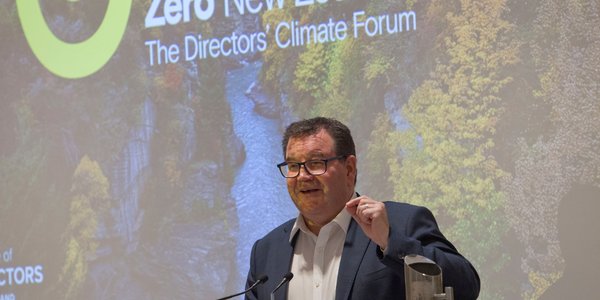Governance news bites – 11 July
A collection of governance-related news that you might have missed in the past two weeks.

Deputy Prime Minister and Minister of Finance Grant Robertson has challenged directors to turn good intentions into action on climate.
“One of the things that often gets raised with government, on any given issue, is: What is the roadmap? Give us the roadmap. I hear this from business all the time,” Roberston said at “Now or never: the role of the director in the climate crisis”, an event hosted by the IoD’s Chapter Zero in Auckland.
“With climate, you have got no excuse. Rod Carr and his team [at the Climate Change Commission] has given us the roadmap.”
The roadmap under discussion is Ināia tonu nei: a low emissions future for Aotearoa, which lays out a plan for emissions reductions across sectors as New Zealand aims to achieve a net-zero greenhouse gas economy by 2050.
Robertson says that will only be possible if boards take up the challenge now.
“There is a great deal of good intention in New Zealand’s boardrooms,” Robertson says. “But I am not seeing that intention translate to action.”

Hon Grant Robertson speaking at the Chapter Zero event 18 August 2022
Robertson says the Government wants to work in partnership with business to enable the transition to a low-carbon economy. He cites budget moves to free up funds to assist businesses to reduce their reliance on fossil fuels as an example.
This is not corporate welfare, which it has been labelled by some, but a practical way to help businesses through a difficult shift.
“Partnership, to move from intention to action, is absolutely critical,” Robertson says, noting that it is the Government’s policy to work with businesses and communities to achieve a “just transition”.
“That roadmap isn’t just for government. We can only do it if all of you are part of it.”
But while a “just transition” is the goal, it will depend on how quickly we can make change today, and how effective that change turns out to be.
“I’d say we [the Government] has been too timid. I’d say the public is starting to get ahead of us. You only have to go to any given high school in New Zealand to learn that is absolutely the case when it comes to climate.”
For boards, Roberson says, the imperative today is to task someone in their organisation with understanding the roadmap and the implications for their business, and to incorporate that understanding into strategy.
Another key starting point is to measure an organisation’s emissions, carbon footprint and climate risks, he says.
“What you measure is what you do. In corporates, that is what happens. The good news is, we are making you do it,” he adds, with reference to the reporting requirements for large organisations that will come into play for 2024 financial statements.
He urges boards not to wait for mandatory reporting or other legal requirements to come into force, but to take a lead on an issue that goes beyond compliance.
“Maybe the minimum doesn’t have to be enough,” Robertson says. “If you just do the minimum, you will sell your business short, you will sell New Zealand short and you will sell the planet short.”
Doing the right thing for the planet will, ultimately, be the right thing for your business, he says.
“We are a point now where it is front of us and we can see it,” he says. “We can also, I hope, see the opportunities that are in front of us and the risks of not taking those opportunities.”
One of those opportunities is to deliver verified low-emissions products and services to global market increasingly hungry for carbon-neutrality.
“This is what consumers are looking for, this is what governments will be looking for, it is what we will be judged on, internationally. Take that challenge seriously from a climate point of view and we will be well on our way to taking the opportunities.”
Chapter Zero, hosted in New Zealand by the Institute of Directors, is part of a global climate action initiative. This global initiative aims to help directors make well-informed decisions on climate policy for the benefit of their organisations, their communities and the world.
The Chapter Zero steering committee in New Zealand includes directors from a variety of organisations including the NZX, Westpac, Air New Zealand, Z Energy, Fisher and Paykel Healthcare, a2 Milk Company and the Arts Council.
Chapter Zero offers our business leaders a chance to tap into the knowledge of their peers and provides access to the ideas of a network of directors who are facing similar questions across different industries.
Also read "Know your number", a summary of Dr Rodd Carr's presentation at "Now or never: the role of the director in the climate crisis” event held 18 August 2022.